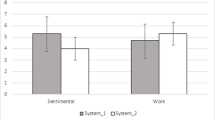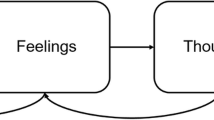Abstract
Optimists (people who have positive expectations about the future) have been shown to perform more health-promoting behaviors than pessimists. This study attempts to alter individuals’ levels of optimism, and thereby their health behaviors, by having them write about a positive future. HIV-infected women (N =40) on combination therapies were randomly assigned to write about a positive future or assigned to a no-writing control group. Among participants who were low in optimism, the writing intervention led to increased optimism, a trend toward increased self-reported adherence to medications, and decreased distress from medication side effects, compared to controls who did not write. Participants who were high in optimism showed the opposite effects after writing about the future. Results suggest that a future-oriented writing intervention may be a promising technique to increase medication adherence and decrease symptom, distress in pessimistic individuals.
Similar content being viewed by others
References
Scheier MF, Carver CS: Optimism, coping, and health: Assessment and implications of generalized outcome expectancies.Health Psychology. 1985,4:219–247.
Scheier MF, Weintraub JK, Carver CS: Coping with stress: Divergent strategies of optimists and pessimists.Journal of Personality and Social Psychology. 1986,51:1257–1264.
Scheier MF, Carver CS: Effects of optimism on psychological and physical well-being: Theoretical overview and empirical update.Cognitive Therapy and Research. 1992,16:201–228.
Scheier MF, Matthews K, Owens JF, et al.: Dispositional optimism and recovery from coronary artery bypass surgery: The beneficial effects on physical and psychological well being.Journal of Personality and Social Psychology. 1989,57:1024–1040.
Taylor SE, Kemeny ME, Aspinwall LG, et al.: Optimism, coping, psychological distress, and high-risk sexual behavior among men at risk for Acquired Immunodeficiency Syndrome (AIDS).Journal of Personality and Social Psychology. 1992,63:460–473.
Kato PM, Figdor E, Zimbardo P: Effects of a time-focused writing intervention on optimism and stress among childhood cancer survivors. Biennial Meeting of the Society for Research in Child Development. Washington, DC: 1997.
Riskind JH, Sarampote CS, Mercier MA: For every malady a sovereign cure: Optimism training.Journal of Cognitive Psychotherapy. 1996,10:105–117.
Gillham JE, Reivich KJ, Jaycox LH, Seligman MEP: Prevention of depressive symptoms in schoolchildren: Two-year follow-up.Psychological Science. 1995,6:343–351.
Seligman MEP, Castellon C, Cacciola J, et al.: Explanatory style change during cognitive therapy for unipolar depression.Journal of Abnormal Psychology. 1988,97:13–18.
Seligman MEP:Learned Optimism. New York: Knopf, 1991.
Pennebaker JW: Writing about emotional experiences as a therapeutic process.Psychological Science. 1997,8:162–166.
Pennebaker JW, Beall SK: Confronting a traumatic event: Toward an understanding of inhibition and disease.Journal of Abnormal Psychology. 1986,95:274–281.
Pennebaker JW, Kiecolt-Glaser J, Glaser R: Disclosure of traumas and immune function: Health implications for psychotherapy.Journal of Consulting and Clinical Psychology. 1988,56:239–245.
Smyth JM, Stone AA, Flurewitz A, Kaell A: Effects of writing about stressful experiences on symptom reduction in patients with asthma or rheumatoid arthritis: A randomized trial.Journal of the American Medical Association. 1999,281:1304–1309.
Cameron LD, Nicholls G: Expression of stressful experiences through writing: Effects of a self-regulation manipulation for pessimists and optimists.Health Psychology 1998,17:84–92.
Chesney MA: Adherence to new HIV and AIDS therapies: A state of the science overview. 106th Annual Convention of the American Psychological Association. San Francisco, CA: 1998.
DHHS Health Resources and Services Administration and The Forum for Collaborative HIV Research:Adherence to HIV Therapy: Building a Bridge to Success, Workshop report, Washington, DC: 1999.
Chesney MA: Adherence to HIV/AIDS treatment. Adherence to New HIV Therapies: A Research Conference. Washington, DC: 1997.
DiMatteo MR, Hays R, Sherbourne CD: Adherence to cancer regimens: Implications for treating the older patient.Oncology. 1992,6(Suppl.):50–57.
Cohen S, Hoberman HM: Positive events and social support as buffers of life change stress.Journal of Applied Social Psychology. 1983,13:99–125.
Roberts KJ, Mann T: Barriers to antiretroviral medication adherence in HIV-infected women.AIDS Care. 2000,12:377–386.
Jaccard J, Turrisi R, Wan CK:Interaction effects in multiple regression. London: Sage, 1990.
Rogosa D: Comparing nonparallel regression lines.Psychological Bulletin. 1980,88:307–321.
Laine C, Newschaffer CJ, Zhang D, et al.: Adherence to antiretroviral therapy by pregnant women infected with human immunodeficiency virus: A pharmacy claims-based analysis.Obstretrics & Gynecology 2000,95:167–173.
Taylor SE, Brown J: Illusion and well-being: A social psychological perspective on mental health.Psychological Bulletin. 1988,103:193–210.
Bower JE, Kemeny ME, Taylor SE, Fahey JL: Cognitive processing, discovery of meaning, CD4 decline, and AIDS-related mortality among bereaved HIV-seropositive men.Journal of Consulting and Clinical Psychology. 1998,66:979–986.
Watson D, Pennebaker JW: Health complaints, stress, and distress: Exploring the central role of negative affectivity.Psychological Review. 1989,96:234–254.
Smith TW, Pope MK, Rhodewalt F, Poulton JL: Optimism, neuroticism, coping, and symptom reports: An alternative interpretation of the Life Orientation Test.Journal of Personality and Social Psychology. 1989,56:640–648.
Watson D, Clark LA, Tellegen A: Development and validation of brief measures of positive and negative affect: The PANAS scales.Journal of Personality and Social Psychology. 1988,54:1063–1070.
Author information
Authors and Affiliations
Additional information
Preparation of this article was supported in part by National Institutes of Mental Health training grant MH19127 to Oscar Grusky and a grant from the State of California Universitywide AIDS Research Program to the University of California, Los Angeles AIDS Clinical Care Center (CC97-LA-175).
I acknowledge the helpful contributions of Jenny Guembes, Ike Grusky, Pam Kato, Lyle Brenner, Fran Manushkin, Laura Klein, Kathleen Roberts, Erica Flores, Sonja Lyubomirsky, and Ruben Vidales, as well as the study participants, who shared their lives with us in their journals.
About this article
Cite this article
Mann, T. Effects of future writing and optimism on health behaviors in HIV-infected women. ann. behav. med. 23, 26–33 (2001). https://doi.org/10.1207/S15324796ABM2301_5
Issue Date:
DOI: https://doi.org/10.1207/S15324796ABM2301_5




